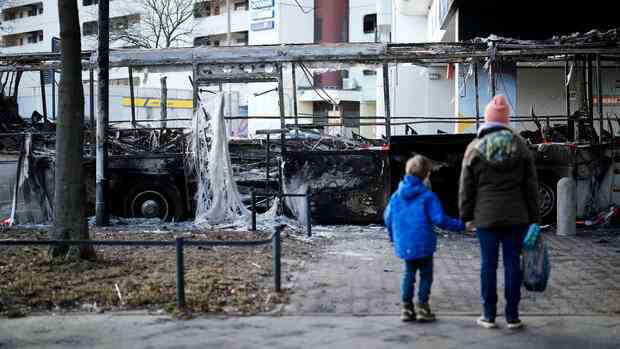We have to ask ourselves how we as a society can prevent such situations.
(Photo: AP)
It is one of the most dangerous reflexes of mankind, and it can be observed again in a worrying way in the discussion about New Year’s Eve: the division of a society into “we” and “them”.
“The” are people with foreign roots who are all too quickly accused of having no respect for the rules of German society. Depending on the degree of resentment, “we” are either the “righteous citizens”, the “organic Germans” or even the “white-skinned people”.
This dichotomy is dangerous. Stigma has never been a good de-escalation strategy. The mayor of Berlin must also be aware of this if she wants to work up the Berlin New Year’s riot this week. The real question should be: How can we as a society jointly prevent the escalation of violence?
It’s a debate that shouldn’t be based on race or skin color. Incidents in Borna, Saxony, where people attacked the town hall and shouted “Sieg Heil” show that there is also a rejection of the state and a high level of violence in other milieus.
Top jobs of the day
Find the best jobs now and
be notified by email.
At the same time, our society, which advocates peaceful coexistence, naturally also includes most of the people with non-German roots who live in this country.
lack of acceptance
What is often misunderstood in the debate about New Year’s Eve in Neukölln: the people who live there suffer the most from the riots. The owners of the small shops who fear for their shop windows. The families with small children who could hardly dare to go out into the street. But those who are now the loudest indignant are not the ones who are sweeping up the shards on site.
About a week after the incidents, it’s time to finally look at the structures instead of just the actors. One of the structures that led to the escalation in Berlin-Neukölln, for example, is a lack of respect. But this phenomenon has two sides.
On the one hand, there is a lack of acceptance for the newcomers by society. Because people with foreign names, dark skin or those who speak broken German still find it too difficult to find an apartment or a job; they are excluded from promotion opportunities. The door to German society is damn hard to open.
As a result, and also part of the reality, there is a lack of acceptance of societal norms by some migrants. That the New Year’s Eve riots were an eruption of an already existing tendency to violence is shown by the fact that the nearby Columbia outdoor pool has to be cleared regularly by the police because of riots.
Here, too, the victims are primarily the Neukölln families. They want harsh punishment for the rioters and do not want to be lumped in with them in the same pot of prejudice.
A better way of living together
So what can the consequences be? Yes, an integration debate is needed. But one that isn’t “us” versus “them” style. By definition, integration means “incorporation into a larger whole”. But that also means that this larger whole must allow for integration. Out of self-interest alone: the economy needs skilled workers, we all want to live in a peaceful society.
>> Read here: Federal government hopes for 50,000 additional workers from abroad per year
It is important to emphasize that integration does not just mean taking in foreigners. A growing proportion of those who were born and grew up here are also being left behind.
The reflex to differentiate between “us” and “them” is deeply human. But it is precisely this thinking that underlies the greatest tragedies of history and the present. Anyone who speaks of social achievements, German values and norms must ensure that this reflex is never allowed to gain the upper hand again.
More: Interior Minister Faeser announces the consequences of Berlin’s New Year’s Eve
